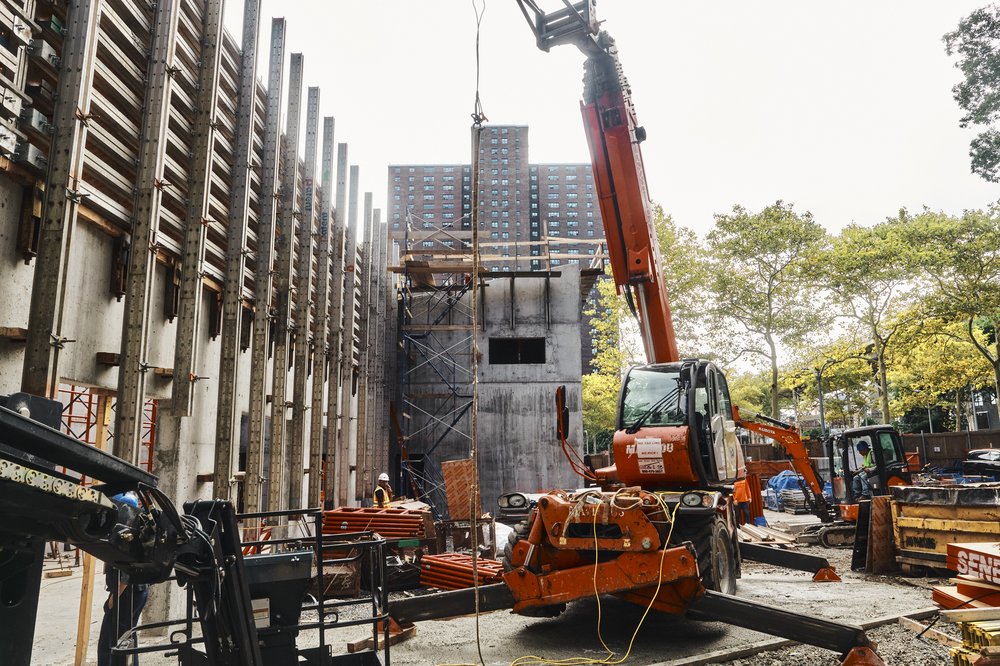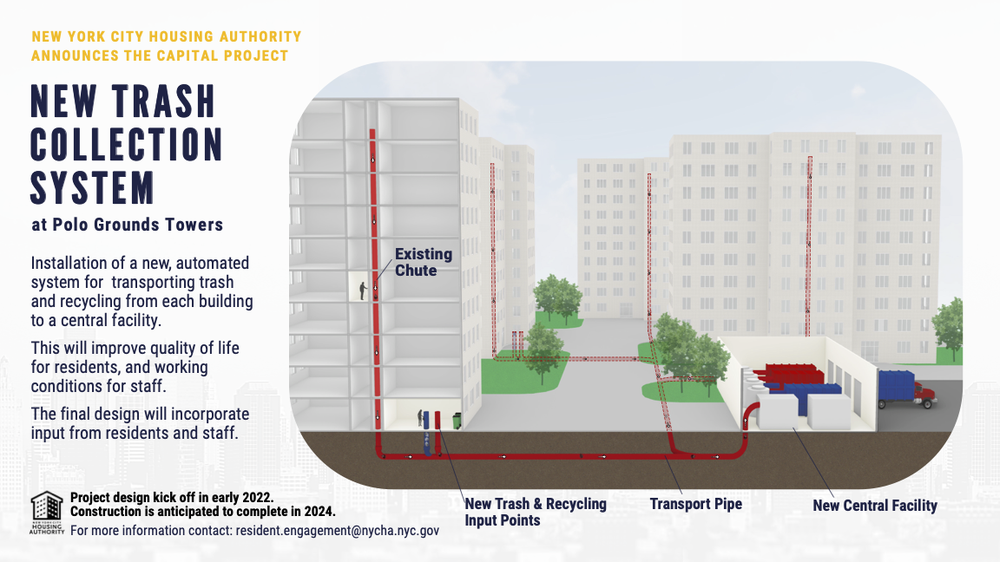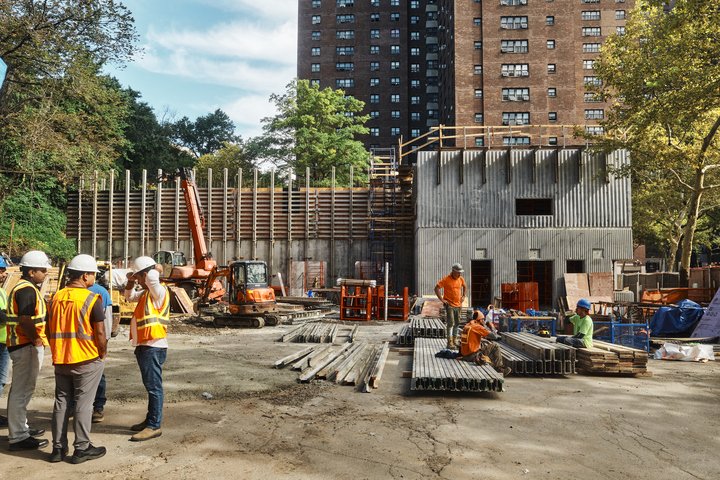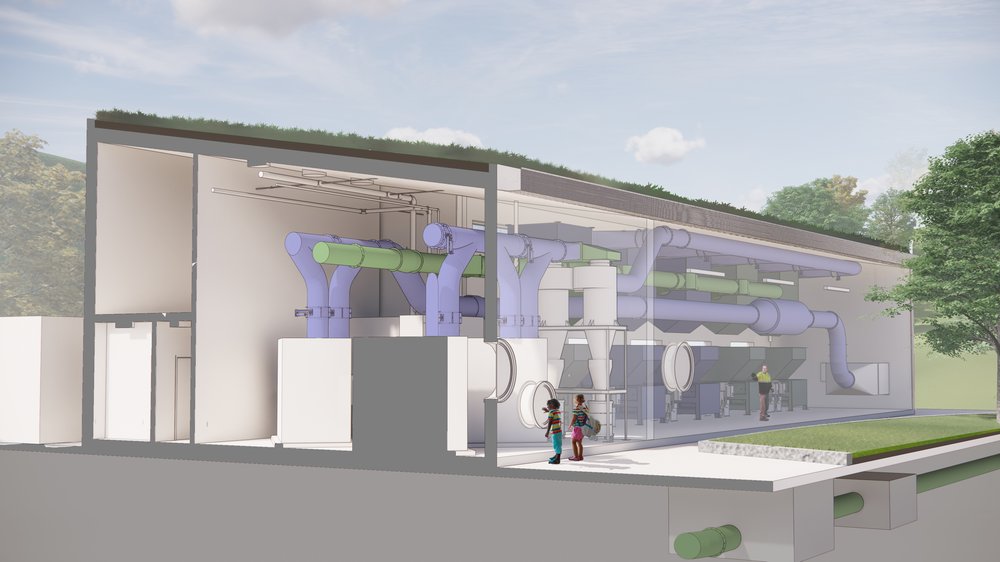Pneumatic trash system coming to Polo Grounds public houses
Oct. 1, 2023, 11 a.m.
The NYCHA project is the first residential pneumatic trash system in the United States in nearly 50 years, since Roosevelt Island built one in 1975 as part of the community’s master plan.

Powerful tubes will suck up trash and recycling debris at 60 miles per hour in a new $32 million garbage system being built at the New York City Housing Authority’s Polo Grounds in Harlem.
The pneumatic garbage and recycling system is the first residential project of its kind in the United States. The project is slated to come online by the end of 2024, and will essentially put dumpsters and piles of garbage bags out of sight for the complex’s 4,000 residents.
The system will use 1,800 feet of 20-inch wide pipes – about the diameter of a large pizza pie – snaking under the development and vacuuming garbage, bottles and cans from the ground-floor trash rooms in the four apartment buildings. Paper recycling will be collected separately.

The Polo Grounds project is the first residential pneumatic trash system in the United States in nearly 50 years, since Roosevelt Island built one in 1975 as part of the community’s master plan. The tubes at the Polo Grounds will handle both garbage and recycling streams, the only pneumatic system in the country to manage both. The project is one of the more cutting edge efforts in the city to transform how trash is handled and reduce the rodent population.
Residents won’t come in contact with the new tubes. They will still use the original gravity chutes in the halls of the 30-story towers to toss their garbage, which lands in ground-floor trash rooms. From there, the refuse will be put into the tube systems and whisked away to a central plant on the southwest side of the campus, where it will be collected by city sanitation workers.
The tubes will be installed in the Polo Grounds’ original incinerator rooms where trash used to be burned right outside the apartment buildings when they were built in the late 1960s — before the city switched to interior compactors in the 1970s, said Juliette Spertus, an urban designer who specializes in trash management at NYCHA.
“So it's like we're almost closing the loop and being able now to move the trash out of here, again, without putting bags out,” Spertus said during a tour of the Polo Grounds.
Crews have just finished constructing the terminal where the trash and recycling will be sent. Installation of the pneumatic tubes will start in November.
Pneumatic garbage systems are common in housing developments in Asia and Europe. NYCHA project manager Katy Burgio said engineers studied large apartment complexes in Singapore as a model for the Polo Grounds.
Automating garbage collection is expected to give the Polo Grounds staff more time to address other problems at the development. NYCHA Deputy Director Siobhan Watson said the grounds caretakers spend about 60% of their work hours carting garbage around and moving dumpsters on tractors.

The pneumatic system “frees up that time for caretakers to spend time caring for the rest of the buildings and being able to maintain healthier conditions in the rest of the campus,” Watson said.
The reduction in manual labor will also help NYCHA staffers avoid injuries and physical strain, Spertus said – an incalculable benefit, she added.
“We don't value the cost of backbreaking labor for maintenance staff and janitors, and … we don't have a cost for quality of life,” Spertus said.
The pneumatic system is powered by noisy large-capacity fans, which are a potential concern for residents living closest to the terminal building, NYCHA officials acknowledged.
“Sound was a big part of our requirements for this work and making sure that the sound wasn't a hindrance for residents,” Burgio said. “The room itself with the fans will have a lot of insulation and space built within the building to help dampen that sound.”
Racket from workers jackhammering bedrock to build the pipe network underground was bothering resident Javier Cordero, 33.

“It keeps me up the days that I have off. It just wrecks my spirit, the construction,” said Cordero, who lives in Building 3 next to the excavation site.
“And if you notice, people throw the trash on the floor anyway. So I don't know why (they put) a big fancy garbage pile over there,” he added, looking toward the new building where the garbage will be collected. “This was so unnecessary, so unnecessary, but it looks pretty. But as long as it looks pretty, that's all we care about.”
But another Building 3 resident said the new trash system will improve what she said was “filthy” and “nasty” conditions by the dumpsters.
“Now the maintenance can focus on another area,” said Denicia Sutton, 40, who has lived in the complex for 10 years with her three kids. “They could focus on fixing the apartments, doing painting and just doing what they need to do on the inside of the home so that we can live a safe, free life.”
Tenant Association president Serena Chandler said in an interview arranged by NYCHA that the construction noise was a temporary tradeoff for progress.
“We currently do have a little bit of construction fatigue, and we know that we're probably going to be under construction for some time to come still,” Chandler said. “But, you know, we can look forward to a better campus and more quality of life. So for me, it's great.”
This story has been updated with the full name and title of NYCHA project manager Katy Burgio.
West Harlem residents say new shared trash bins are an ‘ugly’ sight on historic block